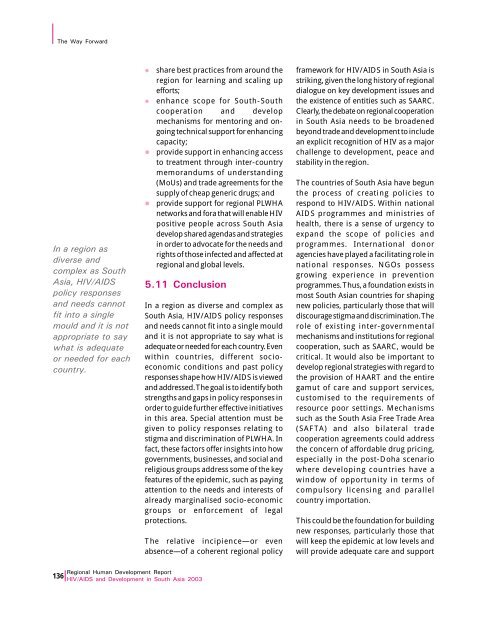Download Report - UNDP Asia-Pacific Regional Centre - United ...
Download Report - UNDP Asia-Pacific Regional Centre - United ...
Download Report - UNDP Asia-Pacific Regional Centre - United ...
Create successful ePaper yourself
Turn your PDF publications into a flip-book with our unique Google optimized e-Paper software.
The Way orwardIn a region asdiverse andcomplex as South<strong>Asia</strong>, HIV/AIDSpolicy responsesand needs cannotfit into a singlemould and it is notappropriate to saywhat is adequateor needed for eachcountry.llllshare best practices from around theregion for learning and scaling upefforts;enhance scope for South-Southcooperation and developmechanisms for mentoring and ongoingtechnical support for enhancingcapacity;provide support in enhancing accessto treatment through inter-countrymemorandums of understanding(MoUs) and trade agreements for thesupply of cheap generic drugs; andprovide support for regional PLWHAnetworks and fora that will enable HIVpositive people across South <strong>Asia</strong>develop shared agendas and strategiesin order to advocate for the needs andrights of those infected and affected atregional and global levels.5.11 ConclusionIn a region as diverse and complex asSouth <strong>Asia</strong>, HIV/AIDS policy responsesand needs cannot fit into a single mouldand it is not appropriate to say what isadequate or needed for each country. Evenwithin countries, different socioeconomicconditions and past policyresponses shape how HIV/AIDS is viewedand addressed. The goal is to identify bothstrengths and gaps in policy responses inorder to guide further effective initiativesin this area. Special attention must begiven to policy responses relating tostigma and discrimination of PLWHA. Infact, these factors offer insights into howgovernments, businesses, and social andreligious groups address some of the keyfeatures of the epidemic, such as payingattention to the needs and interests ofalready marginalised socio-economicgroups or enforcement of legalprotections.The relative incipience—or evenabsence—of a coherent regional policyframework for HIV/AIDS in South <strong>Asia</strong> isstriking, given the long history of regionaldialogue on key development issues andthe existence of entities such as SAARC.Clearly, the debate on regional cooperationin South <strong>Asia</strong> needs to be broadenedbeyond trade and development to includean explicit recognition of HIV as a majorchallenge to development, peace andstability in the region.The countries of South <strong>Asia</strong> have begunthe process of creating policies torespond to HIV/AIDS. Within nationalAIDS programmes and ministries ofhealth, there is a sense of urgency toexpand the scope of policies andprogrammes. International donoragencies have played a facilitating role innational responses. NGOs possessgrowing experience in preventionprogrammes. Thus, a foundation exists inmost South <strong>Asia</strong>n countries for shapingnew policies, particularly those that willdiscourage stigma and discrimination. Therole of existing inter-governmentalmechanisms and institutions for regionalcooperation, such as SAARC, would becritical. It would also be important todevelop regional strategies with regard tothe provision of HAART and the entiregamut of care and support services,customised to the requirements ofresource poor settings. Mechanismssuch as the South <strong>Asia</strong> Free Trade Area(SAFTA) and also bilateral tradecooperation agreements could addressthe concern of affordable drug pricing,especially in the post-Doha scenariowhere developing countries have awindow of opportunity in terms ofcompulsory licensing and parallelcountry importation.This could be the foundation for buildingnew responses, particularly those thatwill keep the epidemic at low levels andwill provide adequate care and support<strong>Regional</strong> Human Development <strong>Report</strong>136 HIV/AIDS and Development in South <strong>Asia</strong> 2003
















